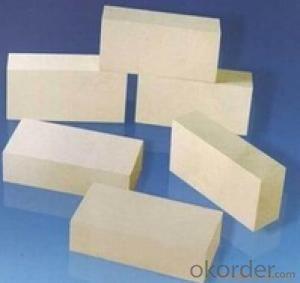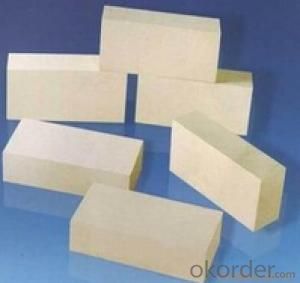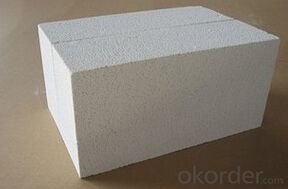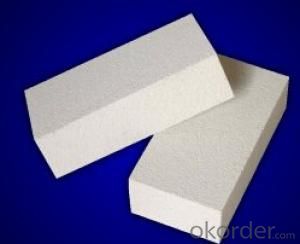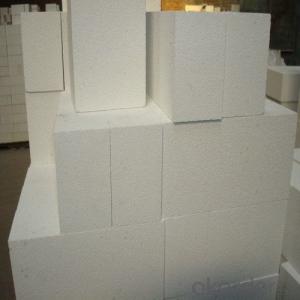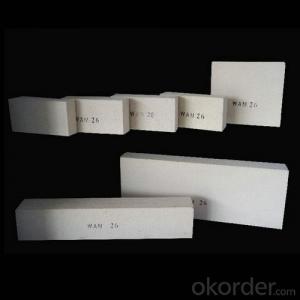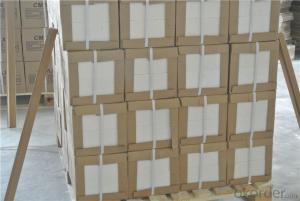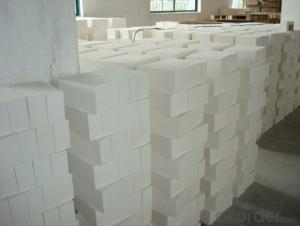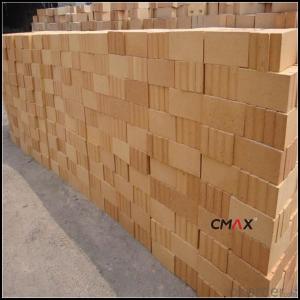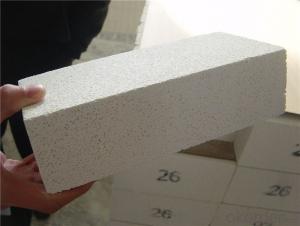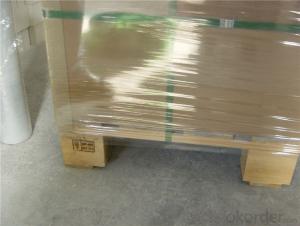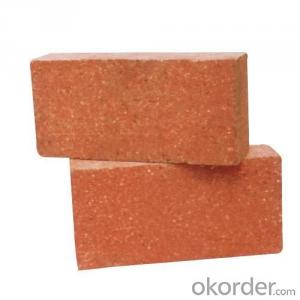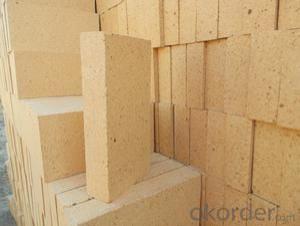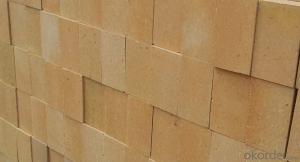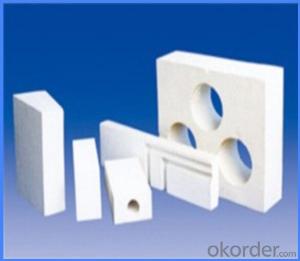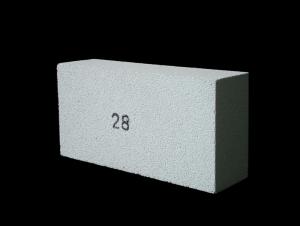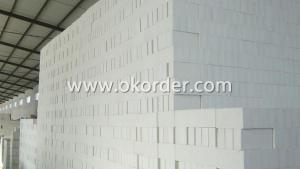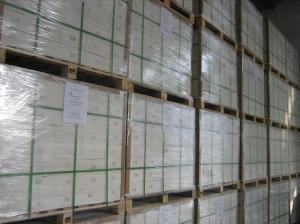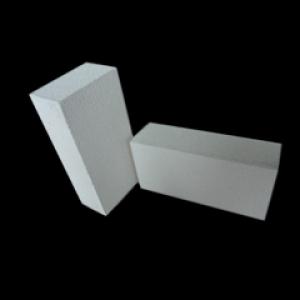Insulating Fire Brick - Lightweight Insulating Fire Brick
- Loading Port:
- Qingdao
- Payment Terms:
- TT OR LC
- Min Order Qty:
- 600 pc
- Supply Capability:
- 6000 pc/month
OKorder Service Pledge
OKorder Financial Service
You Might Also Like
Applications:
Kilns for the ceramic, tunnel, shuttle
Forge furnaces
Carbon baking furnaces
Atmosphere furnaces
High temperature kiln lining
Back up insulating of glass melting tanks
Insulating of tin bath area for float glass
Blast furnaces
Chemical and petrochemical industry
Non-ferrous metal industry
Product Description:
As specified by name, Insulating firebricks are of light weight, low thermal conductivity, excellent strength at ambient and elevated temperature. With very low levels of iron and other impurities, the bricks provide good resistance to chemical attach, can be used in tough, reducing atmosphere conditions. Every brick is ground to precise dimensions.
CNBM (China National Building Material) Group is the largest comprehensive building materials group in China that integrates scientific research, manufacturing and logistics into one entity. CNBM is also the largest building materials and equipment specialists in China. Upon the State Council’s approval, CNBM owns more than 300 subordinate manufacturing factories and servicing companies till now. There are 6 fully owned public listed companies and 11 partially owned with substantial shares public listed companies. In many such of these fields, CNBM is playing a
leading role in the building industry in the country. CNBM International Corporation is the most important import
and export platform of CNBM group. With its advantages, CNBM International are mainly concentrate on Cement industries and devotes herself for supplying high quality series of refractories as well as technical consultancies and logistics solution.
CNBM International is highly recognized by its business partners and clients all over the world and has obtained rapid development under the spirit of win-win. Depending on the support of production divisions and its active staff, CNBM international reached a turnover of USD one billion in 2012. We will carry on the mutual beneficial, create value for our employees, share holders and clients and benefit the whole society in our future development.
Thanks you for your interest in our company products and
services. Your valuable comments are most welcome.
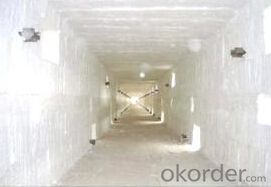
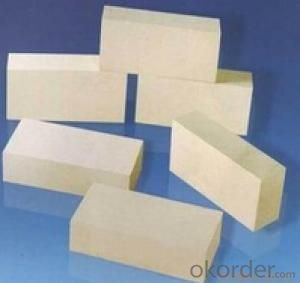
- Q: Do insulating fire bricks require any special fireproof gaskets or seals?
- Special fireproof gaskets or seals are not necessary for insulating fire bricks. These bricks are specifically made to withstand high temperatures and have a strong resistance to heat, eliminating the need for any extra gaskets or seals. They are commonly used in kilns, furnaces, and fireplaces to provide insulation and retain heat. Their composition and structure create a barrier against heat transfer, eliminating the necessity of additional seals or gaskets. Nevertheless, it is crucial to install and align the bricks correctly to ensure a secure fit and optimize their insulating capabilities.
- Q: What are the safety precautions when working with insulating fire bricks?
- When working with insulating fire bricks, it is important to follow certain safety precautions to minimize potential hazards. These precautions include wearing appropriate personal protective equipment such as gloves, safety glasses, and a dust mask to protect against irritation and inhalation of dust particles. It is also essential to work in a well-ventilated area to avoid the accumulation of harmful gases. Additionally, workers should be cautious of sharp edges and corners when handling the bricks, as well as avoid excessive lifting to prevent strain or injury. Lastly, it is crucial to store and handle the bricks properly to prevent any damage or breakage that could lead to accidents.
- Q: Can insulating fire bricks be used in the construction of pottery molds?
- Insulating fire bricks are indeed applicable for the construction of pottery molds. Crafted from lightweight refractory materials, these bricks possess exceptional heat insulation qualities. Specifically engineered for high-temperature applications like pottery kilns, they offer a range of benefits. When constructing pottery molds, it is imperative to utilize materials that can endure the kiln's intense heat. Insulating fire bricks can withstand temperatures of up to 3000°F (1650°C), rendering them ideal for pottery mold construction. They provide insulation to prevent heat dissipation and maintain consistent temperatures within the kiln, crucial for achieving the desired firing results. Moreover, insulating fire bricks can be conveniently shaped and cut to suit the designated mold design. Their lightweight nature also simplifies handling during the mold construction process. Additionally, the insulating properties of these bricks curtail energy consumption by preventing excessive heat loss, making them a cost-effective choice in the long term. All in all, insulating fire bricks prove to be a fitting option for constructing pottery molds due to their capacity to withstand high temperatures, offer insulation, and be easily molded to meet specific design requirements.
- Q: What are the advantages of using insulating fire bricks over other insulation materials?
- Insulating fire bricks offer numerous benefits compared to other insulation materials. To begin with, their high thermal conductivity effectively prevents heat transfer, making them ideal for applications where heat containment is crucial, such as furnaces, kilns, and industrial ovens. Their ability to withstand high temperatures and prevent heat loss makes them a reliable insulation option. Furthermore, insulating fire bricks are extremely durable and resistant to wear and tear. They are constructed with high-quality refractory materials designed to withstand extreme conditions like thermal shocks and chemical exposure. This durability ensures a longer lifespan and reduces the need for frequent replacements or repairs. Another advantage lies in their versatility. Insulating fire bricks come in various shapes and sizes, allowing for easy customization and installation in different applications. They can be effortlessly cut or shaped to fit specific requirements, making them suitable for complex geometries or curved surfaces. This flexibility allows for efficient insulation in a wide range of settings. Moreover, insulating fire bricks possess excellent insulation properties even at lower densities. This means they can provide optimal thermal insulation while also reducing the overall weight of the structure. This is particularly advantageous in industries where weight reduction plays a critical role, such as aerospace or automotive manufacturing. Lastly, insulating fire bricks are environmentally friendly. They are typically manufactured using natural and recyclable materials, minimizing their impact on the environment. Additionally, their long lifespan and low maintenance requirements contribute to sustainability by reducing waste generation and energy consumption. In conclusion, the advantages of utilizing insulating fire bricks over other insulation materials encompass high thermal conductivity, durability, versatility, lightweight design, and environmental friendliness. These characteristics establish them as the preferred choice for insulation in various industries and applications.
- Q: Are insulating fire bricks suitable for use in incinerators?
- Yes, insulating fire bricks are suitable for use in incinerators. Insulating fire bricks are specifically designed to withstand high temperatures and provide excellent insulation properties, making them ideal for use in incinerators. They have a high resistance to thermal shock and can retain their structural integrity even when exposed to extreme heat conditions. Additionally, insulating fire bricks have low thermal conductivity, which helps in reducing heat loss and improving the overall energy efficiency of the incinerator. Their ability to withstand high temperatures and provide effective insulation makes them a reliable choice for use in incinerators.
- Q: Can insulating fire bricks be used in high-temperature insulation blankets for aerospace applications?
- Insulating fire bricks are typically not used in high-temperature insulation blankets for aerospace applications. This is because insulating fire bricks are solid and rigid, which makes them unsuitable for flexible and conformable insulation applications like insulation blankets. Aerospace applications require insulation materials that can be easily molded and shaped to fit complex geometries, such as the insulation blankets used to protect critical components from extreme heat and temperature fluctuations. Instead, high-temperature insulation blankets for aerospace applications are typically made from flexible and lightweight materials like ceramic fiber or silica fiber. These materials offer excellent thermal insulation properties while also providing flexibility and conformability. They can be easily wrapped around or applied to various components, ensuring effective heat insulation and protection. Furthermore, insulation blankets used in aerospace applications are subjected to stringent requirements such as low outgassing, high thermal stability, and resistance to vibration and mechanical stress. Insulating fire bricks may not meet these specific requirements and may not be able to withstand the extreme conditions experienced in aerospace environments. In summary, while insulating fire bricks are excellent for certain high-temperature insulation applications, they are not suitable for use in aerospace insulation blankets. Aerospace applications require flexible, lightweight, and high-performance insulation materials that can conform to complex shapes and withstand the unique challenges of the aerospace industry.
- Q: Are insulating fire bricks suitable for use in the construction of smelters?
- Yes, insulating fire bricks are suitable for use in the construction of smelters. Insulating fire bricks are designed to withstand high temperatures and provide excellent insulation properties, making them ideal for applications such as smelters. They have low thermal conductivity, meaning they can effectively retain heat and reduce energy loss during the smelting process. Additionally, insulating fire bricks are resistant to thermal shock, which is crucial in smelting operations where rapid temperature changes are common. Their high heat resistance and insulation capabilities make insulating fire bricks a reliable choice for constructing smelters.
- Q: Are insulating fire bricks resistant to saltwater?
- Insulating fire bricks generally lack resistance to saltwater. Saltwater comprises substantial amounts of salt, leading to the gradual corrosion and deterioration of the material. To ensure corrosion resistance, it is advisable to opt for refractory materials explicitly engineered for enduring saltwater environments.
- Q: Can insulating fire bricks be used in the construction of ceramic fiber kilns?
- Yes, insulating fire bricks can be used in the construction of ceramic fiber kilns. Insulating fire bricks are designed to provide thermal insulation and reduce heat loss in high-temperature applications. They have excellent insulating properties, with low thermal conductivity, which makes them ideal for use in kilns where high temperatures need to be maintained. By using insulating fire bricks in the construction of ceramic fiber kilns, it is possible to enhance the overall energy efficiency of the kiln and improve its performance. However, it is important to ensure that the insulating fire bricks are compatible with the specific requirements and operating conditions of the ceramic fiber kiln to ensure optimal results.
- Q: Are insulating fire bricks suitable for use in the construction of incinerators?
- Insulating fire bricks prove to be a suitable option for constructing incinerators. They are specifically designed to endure high temperatures and possess exceptional insulation properties. Incinerators operate at extremely high temperatures, often surpassing 1000 degrees Celsius, and require materials that can withstand such intense conditions without cracking or deteriorating. Made from lightweight refractory materials like ceramic fibers or lightweight aggregates, insulating fire bricks possess low thermal conductivity. Consequently, they effectively insulate the incinerator, preventing heat escape and maximizing energy efficiency. Moreover, the insulation properties of these bricks aid in maintaining a consistent temperature inside the incinerator, which is crucial for proper combustion and waste disposal. Furthermore, insulating fire bricks exhibit remarkable resistance to thermal shock, enabling them to withstand repeated cycles of heating and cooling without sustaining damage. This attribute is particularly vital in incinerators, where the temperature can rapidly fluctuate during the burning process. The bricks' capacity to endure thermal shock guarantees their durability and longevity in this high-temperature environment. Apart from their insulation and thermal shock resistance, insulating fire bricks offer additional advantages for incinerator construction. They possess a lightweight nature, facilitating easier handling and transportation during the construction phase. Furthermore, they can be readily cut or shaped to fit specific designs or requirements, allowing for flexibility in incinerator construction. In conclusion, insulating fire bricks stand as an ideal choice for incinerator construction due to their resistance to high temperatures, insulation properties, thermal shock resistance, durability, and ease of use. They provide a reliable and efficient solution for containing and maintaining the intense heat generated in incinerators, ensuring the safe and effective disposal of waste.
Send your message to us
Insulating Fire Brick - Lightweight Insulating Fire Brick
- Loading Port:
- Qingdao
- Payment Terms:
- TT OR LC
- Min Order Qty:
- 600 pc
- Supply Capability:
- 6000 pc/month
OKorder Service Pledge
OKorder Financial Service
Similar products
Hot products
Hot Searches
Related keywords
